A couple weeks back, I had a client of mine send me the link to THIS article titled Embracing Fat for a Healthy Heart Is a Notion Based on Flawed Science. The writer, Dean Ornish, MD, is also one of the docs behind Forks Over Knives, a film that sets out to prove that many of the current diseases and health problems can be solved simply by getting rid of all animal products, fats, and processed foods. If this isn’t your first time visiting my blog, you know by now that I am not picking up what Dr. Ornish is putting down…
Getting rid of processed foods? Hell yes. Getting rid of animal-based products? Oh hell no. Been there, done that, and I am still suffering the consequences and working daily to heal the damage done.
It would be cool if I could end this post now. Sometimes I wish it were that easy, that I could just say “oh hell no” and you would believe me, and move on with your day content, but that’s not real life, and in fact, I am thankful that I get questions, that you want answers, and that you aren’t content to believe everything you read without seeking out the truth. It was contentment that led me to sickness, and it has been questioning and searching for answers that has brought me where I am today. It’s also built in me a desire to help others do the same. So, here I go, debunking this article, and of course, backing up my debunking with proof. Let’s dive, in shall we?
To start, here is the major claim and focus of the article, as it’s stated by Dr. Ornish:
In more than 37 years of randomized trials and demonstration projects, my colleagues and I at the nonprofit Preventive Medicine Research Institute and the University of California, San Francisco School of Medicine have shown that when people with even severe coronary heart disease change to a whole-foods, plant-based diet low in fat and low in refined carbs, their heart disease begins to reverse.
First, I would like to see a link to these randomized trials and demonstration project, but there is none given. Second, though, is this: The crazy thing is that I can actually agree with this claim despite the fact that Dr. Ornish and I have clearly opposing views on nutrition and health. There is one particular line of this argument that we might just be able to see eye to eye on, and that is the part about having folks change “to a whole-foods, plant-based [stay with me here] diet low in fat [don’t bail on me yet] and low in refined carbs.” Let me break this down now bit by bit.
whole-foods
I go into much more depth on this concept HERE, but I believe you would have a VERY hard time finding a single person (educated in nutrition or not) who would argue that real, whole foods are not a better choice than anything processed or refined. Foods in their whole form carry all the nutrients we need to live, thrive, and hold off disease and are so much more powerful than many give them credit for. When I go to Farmers Market every Sunday, I see tables of preventative medicine that just so happens to taste amazing too!
plant-based
Ok, this is where things get a little weird, but stay with me. Do I think our diets should be 100% plant-based? Nope. What I do think, however, is that when you look at a plate, over half of it should be filled with bright, fresh, local, organic produce. If we do the hypothetical math here, and half the plate is filled with plants and the remaining part is filled with properly raised animal protein and high quality fat from those same properly raised animals, organic coconut, or other plants (avocado, olives, etc.) it becomes clear that yes, in fact, a healthy balanced diet SHOULD be primarily plant-based. Where Dr. Ornish gets this wrong, however, is in his interpretation of plant-based referring to 100% plant based, with no meat, little fat, and frankly zero fun. Not only is his approach to food uninspiring, it is also dangerous to your health. We need animal protein and fats in order for our bodies to thrive the way they are meant to (more on this to come).
low in fat
Again, you might be confused, but let me clarify. Not all fats are created equal, and the majority of the fats that the average American consumes are what I like to call crap oils (Thanks to Liz Wolfe for that one) like canola oil, soybean oil, and the like. These fats are cheap, easy to find, long-lasting, and of course, big money makers for the folks (Monsanto) that seem to have a death grip on the food pyramid, agriculture, and the vote. If Dr. Ornish is talking about these fats, then hell yes I agree with him. If he isn’t, well then he should be, and instead of low, he should have said “no.” For starters, there is THIS petition to get Whole Foods to stop cooking with canola oil. So that gets you thinking. Then, there is THIS great post by Diane Sanfilippo that goes into the details of canola oil making and its impact on our health: “rapeseeds + high heat processing with hexane (a chemical solvent) = a grey, awful smelling, non-smooth oil.” And this oil wreaks havoc on your insides. These man-made (non-real food) oils oxidize (go rancid) in the body, leaving your poor insides confused and unable to metabolize them, therefore, storing them in your fat cells. What do we get thanks to these nasty rancid, plastic-like oils? Inflammation. Yikes. And that’s just canola oil. There is also plentiful soybean oil that Americans also seem to consume by the gallon. These fats will make you sick, slowly but surely, but the kinds of fats I support and eat day in and day out are very different; they are whole, nutrient dense, necessary foods. More on the types of fats we SHOULD be eating plenty of can be found HERE.
low in refined carbs
And finally, low in refined carbs. Nailed it. This is an easy one that we can agree on in every sense of the words. Breaking the sugar habit can be as difficult as coming off an addictive drug (or maybe worse for some folks), but the importance of removing refined carbs from our diets is greatly undervalued (or maybe just pushed under the rug), in my opinion. The truth is that Americans are killing themselves slowly in death by sugar addiction, and this society just continues to fuel the vicious cycle.
So Dr. Ornish and I agree on a few things, but let’s get real; we couldn’t be more opposing on some major nutrition points; while he dictates removal of fats and animal protein, I am a HUGE advocate of these foods and for good reason too.
Dr. Ornish comes from a background that has led him to believe, buy into, and now teach what mainstream government and media would like to have everyone believe, and I have now decided to dedicate a large portion of my energy into proving him wrong. HERE is a great post on “4 Superfoods the Media Tells you are Unhealthy.” Imagine that; all 4 of these foods have research to back up their superfood properties AND each comes from an animal. Pastured eggs, grass-fed ruminants, organ meats from properly raised animals, and lard from the same happy creatures. Whether it’s the omega-3s and CLAs, the B Vitamins and Vitamins A and D, or selenium, choline, iron, and riboflavin, each of these superfoods is PACKED with nutrients and healthy fats that your body literally NEEDS to survive, repair, and grow.
In THIS hilarious, albeit incredibly spot on, critique of the movie that made Dr. Ornish so well known, Denise Minger breaks down one of main arguments presented in Forks Over Knives. This bit is probably my favorite (though I recommend you read the whole review). She takes a line from the movie that clearly puts the producers and doctors behind the film in their place:
13:06—But when we consume dietary cholesterol, which is only found in animal foods like meat, eggs, and dairy products, it tends to stay in the bloodstream. This so-called plaque is what collects on the inside of our blood vessels and is the major cause of coronary artery disease.
And then follows with a witty argument against this claim:
Yikes! Did we slip and fall back into the ’80s? For starters, cholesterol from animal foods does not have some magical ability to set up permanent camp in your bloodstream and turn into plaque, just by sheer virtue of its animal-foodness. This was a common line of thought decades ago, but as research progressed, we figured out that the body is actually pretty awesome at regulating cholesterol production in response to what we ingest from food. As this paper from 2009 explains, the supposed link between dietary and serum cholesterol stems from studies that had fundamental design flaws, failed to separate the effects of cholesterol different types of fat intake, or were performed on animals that are obligate herbivores (hey there, rabbits!). The doctors in “Forks Over Knives,” it seems, are among the few stragglers who still believe dietary cholesterol is harmful.
It’s clear as day really, and it’s time all doctors, educators, RDs, parents, and law-makers got on board and put health before money, especially considering today’s kids are the first generation that is not expected to live longer than the generation before them. It’s heartbreaking really.
I would like to leave you with THIS amazing article courtesy of the Russells of CrossFit HQ. It provides the perfect example of why you can’t believe every “study” you read about because behind every study is a fallible and most likely very biased team of folks eager to prove their hypothesis and ready to “tweak” the findings to do so. In this case, an ACSM Fellow tries to de-bunk the Paleo diet and fails beautifully in the process. Ultimately, you can read every peer reviewed study you’d like to (and I recommend you do get your eyes on a few), but the real study that matters is the one you perform on yourself. Cut out the crap, increase the healthy animal fats that you consume, eat moderate amounts of protein to fuel your individual needs, and see how you feel. Add in more organic, local produce to your diet. What’s the outcome? If it works, well then keep on doing it. If it doesn’t try something else.
And ALWAYS feel free to reach out for help. With technology at our fingertips, there are so many bloggers, educators, Nutrition Consultants, and friends to reach out to for advice, support, or ideas. Don’t hesitate to ask for help because there is someone out there who wants to help. Heck, I am one of those people, and I am just a comment or email away!
Now, in honor of the celebration of the many benefits of FAT, here is a recipe for delicious, fat-filled beef bacon bolognese that will fill up your stomach and your soul, all while delivering the many health benefits of fats.
Beef Bacon Bolognese (GF, NF, DF)
WHAT YOU NEED:
- 1.5 lb grass-fed ground beef
- 3 TB butter or coconut oil
- 1/2 cup chopped pastured bacon
- 1 large onion, diced
- 3 cloves garlic, minced
- 3 carrots, diced
- 2 tsp dried oregano
- 3 TB tomato paste*
- 1 bay leaf
- the equivalent of 2 cans whole meaty tomatoes*
- sea salt and pepper to taste
- 1/4 cup fresh tarragon
- 1 large organic spaghetti squash
*make sure you go for a brand that is organic and has no added sugar or preservatives
More notes on ingredient choice can be found HERE
WHAT YOU DO:
- preheat oven to 350 degrees
- heat a large dutch oven or pot on the stove top and add 2 TB of cooking fat
- cook the ground beef and bacon until cooked through
- use a slotted spoon to remove the meat and set aside (leave the juices!)
- cook the carrots, onion, garlic and oregano until soft in the meat juice on medium heat
- add the tomatoes, tomato paste, meat a sprinkle of salt and pepper and bay leaf (make sure you add salt as you cook, not all at once)
- bring to a boil and then reduce to a simmer for about 40-45 minutes, stirring occasionally, tasting, and adding salt if needed
- now, cut your spaghetti squash in half length-wise and remove the seeds
- rub the rest of your butter or coconut oil on the halves, place them cut side down on a baking sheet, and put in the oven for about 30 minutes
- check on them at around 25 minutes with a fork. It should easily break in strands to form pasta (make sure you don’t overcook them, or you’ll have mush)
- pull spaghetti from squash with a fork (this should happen easily) and serve in bowls
- spoon generous portions of your meaty, bacony sauce on top
- garnish with fresh tarragon and ENJOY!!
There is something so deliciously simple about spaghetti squash and bolognese. Plus, leftover spaghetti squash is delicious all week long, topped with whatever your heart desires! Go enjoy your fat today! Comment below with the benefits you have seen since adding more fat (and getting rid of sugar) in your lives.
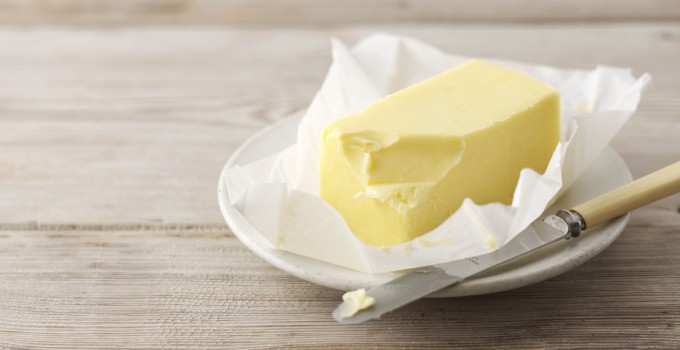
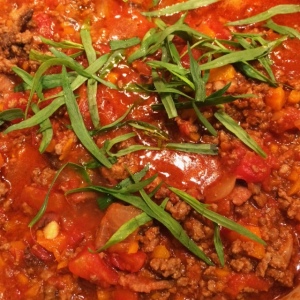
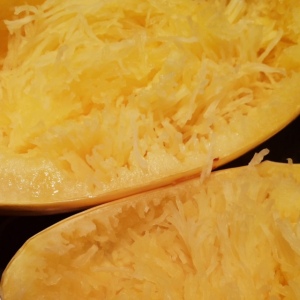
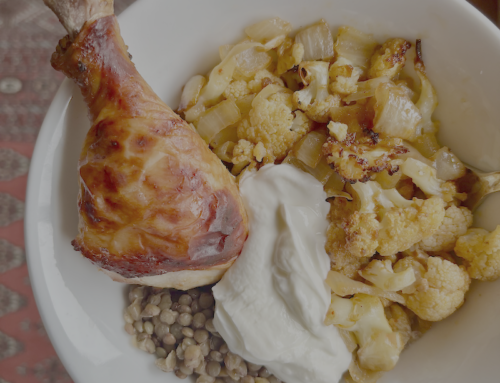
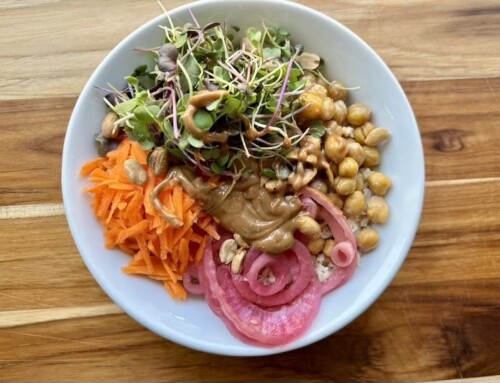
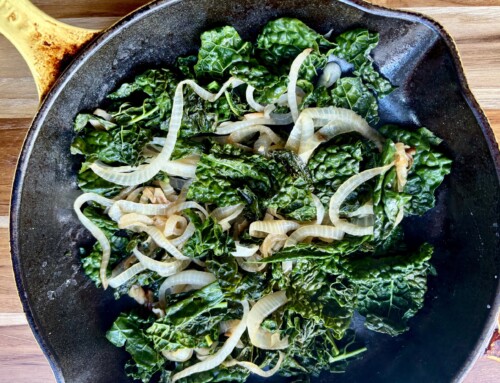
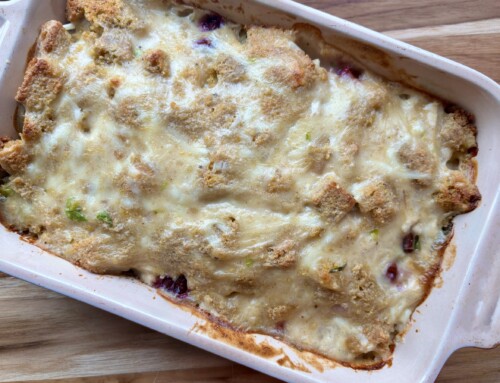
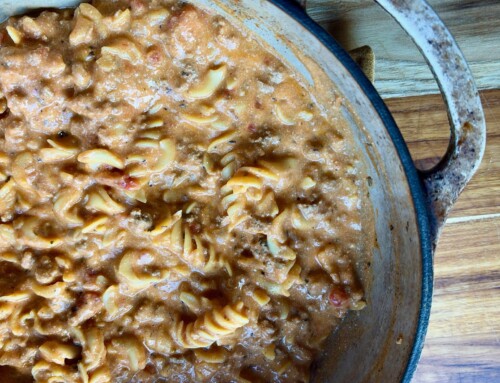
So informative! I wholeheartedly agree that it’s important to educate ourselves and read these peer-reviewed studies, but nothing beats the first hand knowledge we gain from testing things on ourselves. Everybody and ever body is so unique and what works for some will not work for others. Even then, while things may seem good on the outside, our biomarkers may tell us something different. Oftentimes the way we feel doesn’t catch up with what’s actually going on inside for quite some time. All I know is that since I’ve moved to a meat and nuts breakfast and high-fat life my digestion has improved, I’m feeling less exhausted throughout the day, and I’m generally a happier, more satisfied person 🙂
Thanks for sharing your story! That is so awesome to hear. I agree 100% we all need to listen to our own bodies, learn what health feels like, and eat to fuel and heal. Love that you are happy!